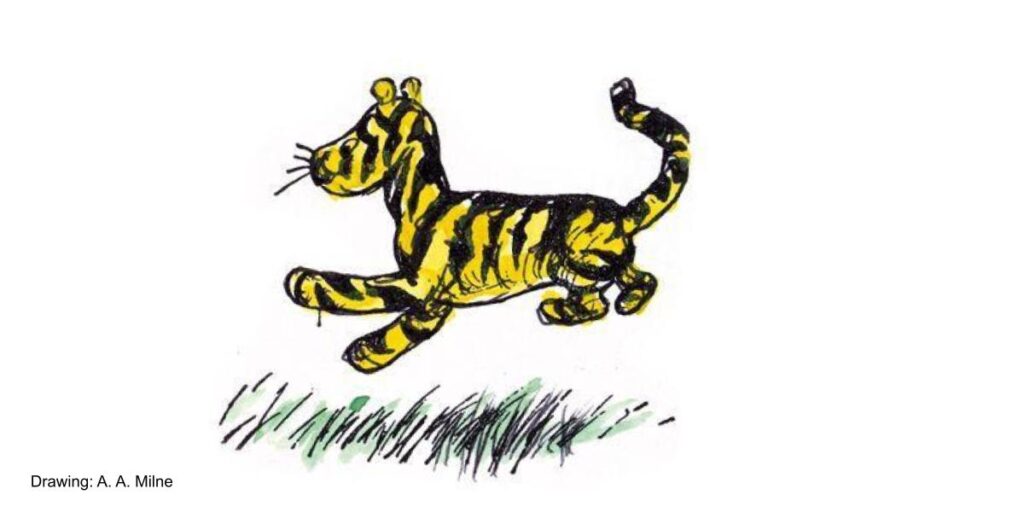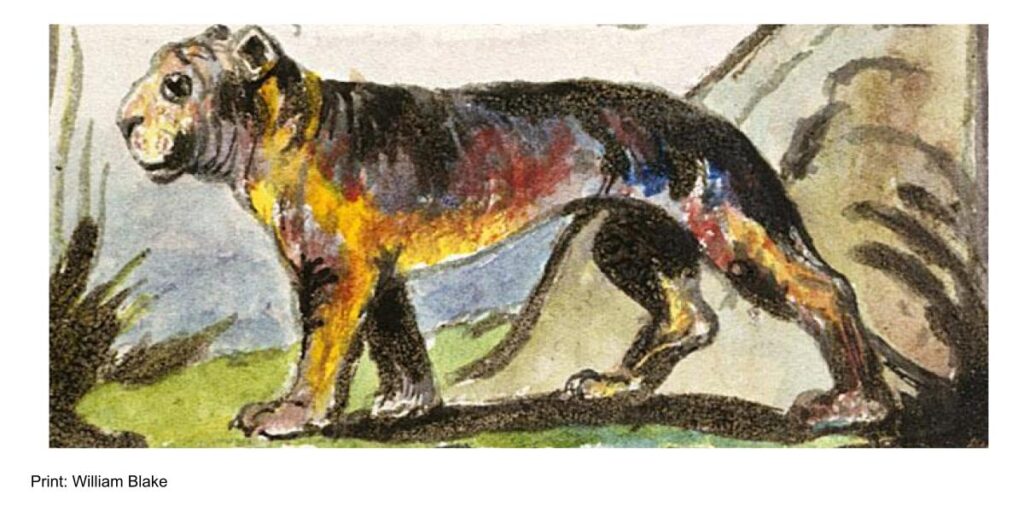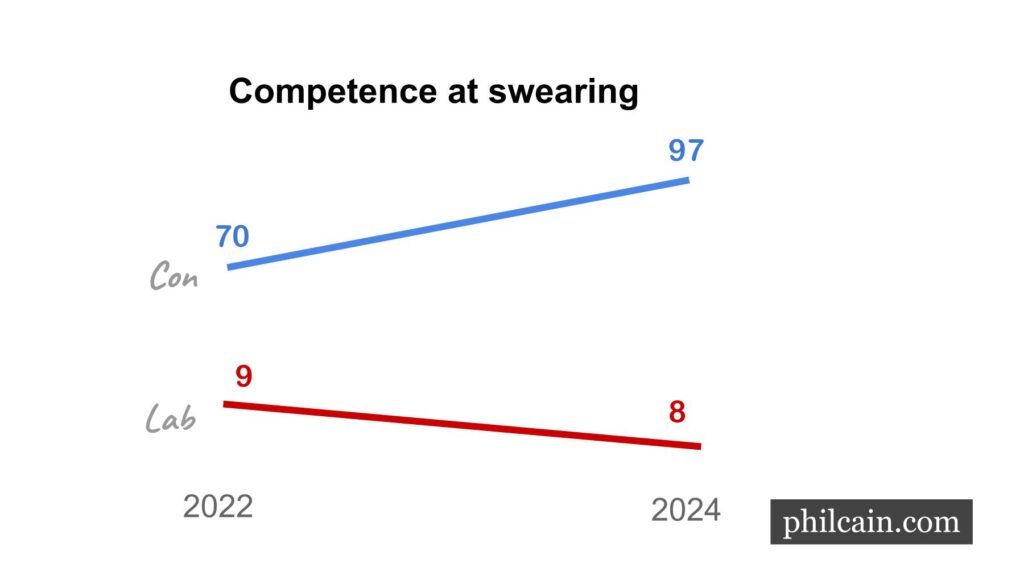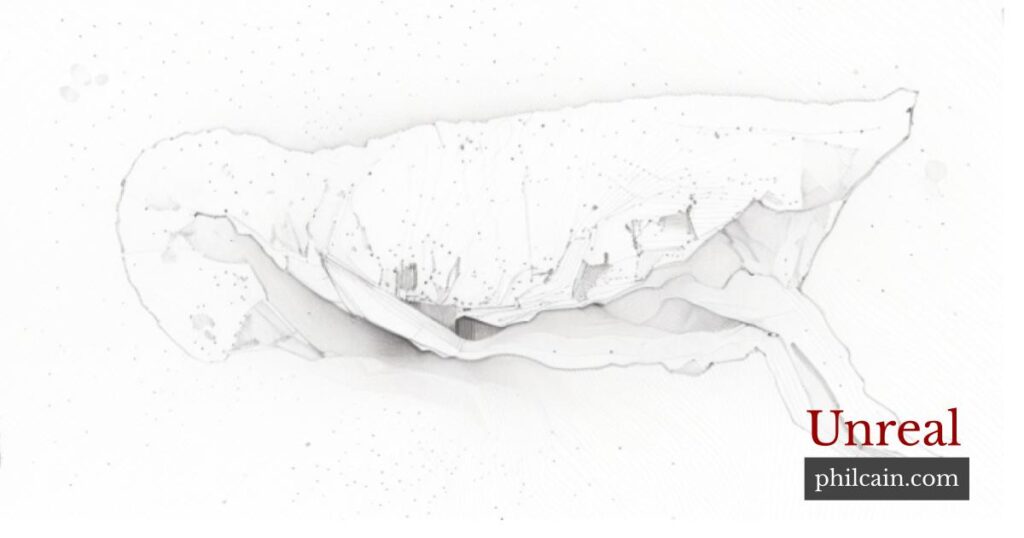
None of the characters in this story is a real person, other than the pianist.
writing, journalism, books, events, recreation
by philcain

None of the characters in this story is a real person, other than the pianist.
by philcain
Winnie the Pooh meets William Blake, with apologies to Blake and A. A. Milne

The Tigger
By Phil Cain
Tigger Tigger feeling light
Forever bouncing to great height
What immortal hand or eye
Would thwart thy primal bid to fly.
What great lows and highs
Has put such shine in thy eyes?
Since the starting pistol fired
Neither have thee paused nor tired.
What great seamstress applied her art
To the pounding of thy heart
And when this organ began to thump
What made thee get right up and jump?
What creator sowed thy mane?
And did she also crochet thy brain
What the needle what the hooks
Fixed thy wild-eyed looks.
When the almighty created bears
And tended to their wonky ears
Did she smile her work to see?
Did she who made Eeyore make thee?
Tigger Tigger feeling light
Forever bouncing to great height
What immortal hand or eye
Would thwart thy primal bid to fly. ■

The Tyger
By William Blake
Tyger Tyger, burning bright,
In the forests of the night;
What immortal hand or eye,
Could frame thy fearful symmetry?
In what distant deeps or skies
Burnt the fire of thine eyes?
On what wings dare he aspire?
What the hand, dare seize the fire?
And what shoulder, & what art,
Could twist the sinews of thy heart?
And when thy heart began to beat.
What dread hand? & what dread feet?
What the hammer? what the chain,
In what furnace was thy brain?
What the anvil? what dread grasp.
Dare its deadly terrors clasp?
When the stars threw down their spears
And water’d heaven with their tears:
Did he smile his work to see?
Did he who made the Lamb make thee?
Tyger Tyger burning bright,
In the forests of the night:
What immortal hand or eye,
Dare frame thy fearful symmetry? ■
by philcain

Things not looking great for the Conservatives. But is anyone measuring public confidence in creative swearing? https://t.co/2LYC8pT1Ma
— Phil Cain (@philcaincom) January 24, 2024
by philcain

This is fiction written in an hour with the Sunday Writers’ Club at an exhibition of work by abstract expressionist Robert Motherwell at Vienna’s Kunstforum with the prompt. “While wandering the gallery you notice another visitor who is crying. They stand, transfixed, staring at a painting as the tears stream down their cheeks. You approach this person to make sure they’re OK.”
It seemed wrong to intrude on what was clearly a painful and private moment when I first passed. But she was still there as I was about to leave the gallery twenty minutes later, alone, rooted to the spot, visibly upset.
It seemed wrong not to at least ask if she was okay. That plus she was somewhat attractive. I did my best to approach the painting and stand beside her, as if by accident. She turned to me sharply, as if to ask what I was doing standing there. I was clearly not very convincing.
“A very moving picture. Very moving indeed,” I said solemnly.
“Moving? What the fuck do you mean? It’s not moving anywhere, it’s a fucking painting.”
Her voice did not match my expectations. How could someone so rough hewn be so affected by a painting. It must be a working class pretence she had adopted at art school and not shaken off.
“I-I mean, you know, moving, it’s emotionally affecting, it stirs the feelings, moving in that sense,” I warmed to my theme. “Is the viewer not compelled to feel a deep pang of sadness for the heroic patch of brown so vainly fighting against the prevailing blackness? Are there not echoes of the dark chaos engulfing the ochre earth of the Iberian peninsula only two decades before?”
“Oh, right, yeah. That kind of moving. I had never really thought of it like that,” she said, angling her head to try to see what I was talking about.
“You didn’t? How can you say that when you’ve been observing the painting for so long, weeping?”
“Oh, yeah, that. That’s a bit, well, complicated. I work in the caff here and can’t be seen talking to customers. But buy me a coffee round the corner in ten minutes and I’ll tell you.”
This meeting seemed unlikely to be the exchange of artistic sensibilities I had been in search of, but I agreed.
She told me that years ago her mother had given her an old painting on board. It was a picture of a cottage surrounded by trees with a woman picking apples in the sunshine. Two children in white smocks were playing with a wooden toy in the long grass.
Her granddad, Sid, had picked it up at a flea market. Then her mum had passed it on to her as a parting gift when she first left home to start work in a London department store.
“Here you are, love. This’ll keep you feeling nice and snug in your new place,” her mum had said. She did her best to look grateful, but she hated it. It was so twee and saccharine, not at all her thing.
“What the fuck does a 20-year-old do with an old painting? At that age you’ve not got a clue.”
Still, she had packed it into the back of the car with her pots and pans, to please her mum.
Then her mum phoned to say she had seen a picture just the same on one of the antiques programmes. It had gone for a little short of £50,000. And she was right, it did look just the same. On her way to work in the gallery cafe she had seen Iberia No 2.
It reminded her of the night years ago when she and her flatmates had taken a spatula and white spirit to the picture. Laughing they had scraped away the thick layers of cracked and flaky paint. There was just a bare board where once there was a country cottage, a woman and two little children. ■
by philcain
This is fiction.

Watching the little people milling like ants below his snugly-slippered feet brought the reassuringly delicious combination of pity and scorn. “A certainty in an uncertain world,” mouthed the serial entrepreneur Ken Midas, tucking his signature long grey hair behind his ears as he prepared for his daily trance.
The scurrying, bug-like people below were not like him and never would be. He was the inventor of the revolutionary silent fridge. He alone discovered a novel way to suspend an electric pump in a way which almost completely eliminated vibration, so minimising ambient noise. Those little people had not. Hardly any of them even had the first idea about the way vibrational noise radiates into the environment from poorly suspended pumping devices.
Not only that but he, not they, had for 43 years successfully defended the patent on devices using his revolutionary method. He had beaten every challenger. Not for nothing was it that he was called “the undisputed champion of the world defending his intellectual property” by the Wall Street Journal. None of the little people below, who barely even looked like proper people from the 27th floor, had been described as the undisputed champion of anything, let alone in defending intellectual property. Doing it was really hard, nobody could deny that, not if they knew what they were talking about.
Nobody to the horizon he could see stretching away as he looked over the city skyline could take any of his achievements away from him. Law prohibited it and quite right too. They could not legally take away the billions of dollars, sterling, yuan and yen in bank accounts across the globe, managed by a well-drilled legion of tax accountants. As a second line of defence he had assembled lobbyists, political aids and spokespeople to defend the fundamental principle that every penny should be his and his alone.
He closed his eyes now, standing, raising his arms to shoulder level palms up, belly breathing, as his life coach Angelo had shown him. He pictured himself as first as a rocket, then blasting off, rising, slowly, accelerating fast, pushing hard through the vibration propagating atmosphere, becoming viscous at this speed, sticky, holding him back. And then into clear, freedom of weightless orbit, beyond the selfish grasp of gravity, floating free, gazing down on his world. This is where Angelo was dead wrong, and his wife, about the need to ground himself, which was why they both had to go. Hanging there, free, alone, and taken into orbit thanks to his massive achievement.
He wavered for a second in the excitement and had to peep through his eyelids to steady himself, before closing them again, rocking his head back. Nobody could threaten the power and satisfaction he had from control of his empire, this army, this treasury of intellect, the backup of billions, together with the recognition and respect that went with it. He had had his ups and downs, for sure, but invention had meant refrigerators–and heat transfer devices in general– had entered a new era, opening massive new commercial opportunities. And with these commercial opportunities had blossomed something little short of a social revolution.
Thanks to him people were no longer afraid to have fridges in more intimate spaces, disrupting their sleep or making an annoying rattling sound while they watched a movie or meditated, like he was now. People now used endless variants of his patented Phrygia device. Some used them even to near-silently cool their bed on hot days. Phrygias were built into the arms of sofas and cars, for cooling drinks and ice creams for a non-stop sensory barrage of chilled food and beverage items.
The industry had found the public unexpectedly receptive to ice-cold smoothies or a protein shake in bed. Midas Research, part of the marketing department, encouraged this habit by commissioning research to show that cold nutrition taken lying down helped reduce anxiety, boost mood and potentially improved cardiac function. It got little traction in the scientific community, but since when did they change anything? Success in the real world comes from telling stories people want to hear, not from getting bogged down in facts and figures. It was no coincidence that the last few James Bonds impressed their conquests by pulling chilled food and beverages from under the bedcovers. That was how you changed the world.
The wall behind the standing, swaying Ken Midas contained a gallery of press cuttings, all neatly preserved behind glass. His eye caught the headlines “Meeting Ken Midas, the king of cool”, “More than a morning smoothie”. The centrepiece of all of them was one from the mid-2020s in bed with one of his early Phrygia fridges. The photoshoot had coincided with the well-publicised breakdown of his marriage during an unusually spectacular midlife crisis. His above average looks and far better than average bank account were enough for a half-way done beano of epic proportions. It became a well-worn joke that Ken Midas would sleep with more or less anything including household appliances.*
The refrigeration breakthrough that first made him rich was thirty years ago now but it remained the centrepiece. He never matched it, despite having far greater resources. The EatMan, a pocket toaster and microwave, fell victim to a class action lawsuit brought by those who had suffered pocket fires in which Midas Inc settled for damages of $1.7bn. He had been quoted as saying that the reason for the problems was “not the fault of the device but the fucking idiots using them”, he had said in and interview with the Financial Times. “It’s not the EatMan that’s the problem, but the fact that the people using them are completely stupid,” he said during an interview with Newsweek. The company ultimately had to recall the entire production run of 190,000 EatMans.
Thoughts of this episode buzzed through his head forcing him to lower his now aching arms, moving back to his large empty desk. The EatMan was the disaster which ultimately brought him to this fabulous office of the President Emeritus. The Midas share price had plummeted and his statements had only compounded the problem. Nothing was clearer than that customers–some singed–were unhappy being called stupid by a man famous for sleeping with a refrigerator. The popular outcry led by those burnt by the EatMan led the board to tell him the only way to save the company, and his fortune, was for him to step aside.
Midas sank into his high-backed office chair covered in supple white leather all kept at optimum sitting temperature by Phrygia. He pressed a button on the desk, “I am not taking calls,” he said. He lowered himself into his heat controlled supple leather sanctuary to think of a follow up, while picturing all the people beetling aimlessly below him.
“Idiots,” he thought, closing his eyes. ■
*This joke was first told by a little-known stand-up called Brian Murray in the Frog and Fly pub in Luton, but statistics suggest it has since been told by around 54% of the world’s population.
by philcain

One day a man going to the nest of his goose found there an egg all yellow and glittering, or so he said. When he picked it up it was as heavy as lead and he was going to throw it away, because he thought a trick had been played upon him. But he took it home and soon found to his delight that it was an egg of pure gold. One day he grew greedy; and thinking to get at once all the gold the goose could give, he killed it and opened it only to find nothing.
“Oh, brilliant. You killed the fucking goose that looked like it might save us? That’s just brilliant, Colin. Just brilliant. What the fuck are we going to do now?” Helen hissed, perched heavily on a barstool in the kitchen living-room of a fiercely contemporary barn conversion.
On the smoothed hardwood bar in front of her the now-frozen goose seemed to look at Colin through the fogged plastic bag with much the same accusatory expression as breathless, seething Helen. Her pinkish neck extended and chest heavily beneath her large white maternity smock.
“Don’t worry, my dearest,” said Colin, twirling his waxed moustaches on either side and then pinching his beard to a point in the middle, shooting a mischievous look. Despite his bravado he was on edge. He had thoroughly prepared himself for this for this moment, having taken a look at the inner workings of their prize goose.
“Don’t ‘dearest’ me, Colin. I gave up a cushy job in call centre management to help you with this hair-brained goose venture. We’ve mortgaged ourselves to the hilt and I’m up the duff. And now you’re telling me that you literally killed our businesses one asset stone dead. Tell me, how do I not worry?”
This, Colin realised, was not going to be an easy discussion. Helen, who was normally remarkably even-tempered, had become more irritable as her pregnancy progressed beyond the seventh month.
“Hear me out, my…,” he caught himself before doing it again. “My discovery is not the obstacle it might first appear to be. We have, in fact, made enormous progress in establishing the foundations of the business going forward.”
“The kind of enormous progress a fisherman makes when they sink their boat or a baker makes when they burn down their bakery?”
She was taunting him, but he held his nerve.
“No, no. This is where our business differs so fundamentally from such humble activities. Far from destroying value, what I have done is secure our financial future.”
“What? I don’t understand? Let’s look at the facts, shall we? Having blown all our golden eggs on this property we have just two golden eggs left in reserve and now one dead golden-egg-laying goose,” she said, jabbing an accusing finger into the breast of the partially-thawed goose.
“Ah, you are, of course, quite right in the factual details, m…,” he hesitated. “But, taken together with the full market context, the essential research I did on the goose has not been a disaster for the business. It is far from being a disaster. It has in fact revealed the true uniqueness of our golden-egg-producing-goose, while also ensuring us against devaluation of her eggs by decisively limiting their number, so ensuring their rarity. They are now a limited edition. In short, this means we can be certain the value of the eggs is not only maintained over time, but increases.”
“You are talking complete gobbledygook. How can having a dead goose possibly be better than having a live one?”
“Ah, well, that is where it gets really interesting. What we first need to do is to spread our new success story as widely as possible, making the story of this remarkable goose the talk of the and her eggs an unshakable benchmark of value.”
He continued with this babble, twirling his beard and hopping from foot to foot. He could keep it up for as long as it took to wear someone down. It could have been hours or days, but it was in reality two hours twenty-seven minutes and thirty-three seconds.
He first talked, offering some examples and diagrams on a notepad. He answered her volleys of questions quite effortlessly. Though she did not understand a word, her worries gradually seemed foolish. She was first angry, then suspicious, then exhausted, then hopeful, deeply, deeply hopeful.
This was the answer. Her breathing was now deep and soothing. She was sure this was the beginning of something, just as she had been sure when she first met him on retreat in the Scottish mountains. She was sure as she had been three weeks after when he had took her in his arms and invited her to be his partner in his goose venture and make babies in this soulless barn.
Gone were the doubts and gnawing anxiety that grew in her when she fell pregnant in that cold, isolated barn miles from anywhere. Gone were the doubts that rose when she found that he was already married. And gone was the stab of worry that took her when the bank account showed that the appetite for goose meat and eggs was not a fraction of what he had said. She felt as happy as when he had persuaded her that one of the geese had started golden eggs, perhaps happier still.
Colin was equally exultant as he looked at her freshly flushed face. More important than convincing Helen was that he had convinced himself. And he had done so fully. The ideas he had created buzzed now round his mind filling him with glee and excitement. This is how it had to be. There was no hope of implementing his ambitious plans for the goose if he did not embrace it himself. How could he expect anyone else to believe him if he showed any doubts himself? His anxieties and doubts had dropped away and he knew he was radiating the overwhelming confidence he felt when life went well for him. The power surged through him like the energy of an inner nuclear fusion.
She had heard from him how the goose’s value and that of the miraculously egg could be maximised and multiplied. Far from being a disaster, the untimely death of the golden goose was a masterstroke. It was not the death of a goose, but the birth of a suite of businesses under the umbrella of GooseTech.
It signalled the moment when the goose could finally be genetically sequenced. Researchers could then buy the rights to the DNA database to help work out what gene might have been responsible for the appearance of the golden eggs. There were millions of scientists willing to part with a few tens of millions of dollars to unlock the potential of endless gold production. The goose weighed 4kg, and each sample need only be one nanogram, or one billionth of a gram. So potentially there were 4 trillion samples. If they were sold at 1,000 dollars a sample, that would mean sales of $4 quadrillion.
The golden egg itself too would be the root of many times its raw value as scrap gold. It would be legendary and unique. It could be carefully micro-sampled and sold at, say, $12 per dozen atoms to those wishing to work out how the egg came to be. That works out at 4-with-22-zeros-after-dollars, or $4 million quadrillion. Then there was Goosecoin, a crypto meme currency linked to a picture of the goose looking out of its plastic bag, which would quickly build a cult following among individuals who wanted to get in on the action.
Within months of the demise of the goose the venture capital community had invested billions in GooseTech Inc, sensing big profits. They were mesmerised by Colin’s complete confidence, pointed beard and side-to-side hopping. He seemed so ludicrous and the idea so idiotic that it must be pure genius. They invested enough of other people’s money to make GooseTech the first mega-unicorn, that is a private company with a valuation of well over $1,000bn.
After a year a handful of investigations of the DNA and golden goose egg came up with nothing other than that it was a regular goose. And the gold samples too revealed that it was 22.3 karat gold. This amounted to a total revenue for GooseTech of just shy of $400 dollars, not including postage costs. No matter how much Colin hopped from foot-to-foot and pointed his beard, people wondered openly if there was much sense in doing any more tests. Would another test reveal a different answer? And there was talk of how Colin’s only previous business experience was as an estate agent in Kettering. This business, never wildly successful, had been wound up by order of a magistrate after he was found to have spent tenants’ deposits on a camper van.
It was said to have been the biggest fraud since the last biggest fraud. Colin, who had been syphoning company funds to his own account, went on the run. On a tip-off from Helen he was picked up, clean shaven on route to the Cayman Islands with a suitcase of thousand dollar bills. If found guilty he faces up to 3,466 years behind bars. ■